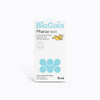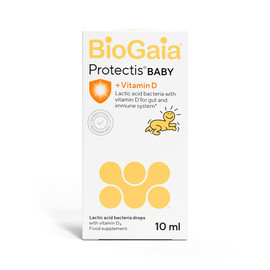Probiotics for children's immune system
A high-quality food supplement formulated specifically for babies, toddlers and children, BioGaia Pharax Kids with Vitamin D contains a unique blend of two, scientifically researched probiotic strains. With added Vitamin D3 to help maintain immune health*. Containing the patented lactic acid bacterium L. reuteriProtectis®, BioGaia Pharax Kids is shown to survive stomach acidity and reach the gut alive. Suitable from 6+ months.
*Vitamin D contributes to the normal function of the immune system in children. Limosilactobacillus reuteri (formerly known as Lactobacillus reuteri)
- Contains one of the world's most researched probiotic strain**
- Suitable for use from 6 months of age
- Complements the natural microbiome
- Vitamin D3 and dual strains of Lactobacillus reuteri
- Just 5 drops in the morning, 5 at night for 10 days
**According to Pubmed. April 2025
What are probiotics?
Probiotics are defined as "live microorganisms that, when administered in adequate amounts, confer a health benefit on the host." (WHO/FAO 2002, Hill C et al. 2014).
Are baby probiotics safe?
Yes. All BioGaia probiotic products, including our baby probiotic drops, have been tested in clinical studies and found to be suitable and effective.
What differentiates BioGaia probiotics from other probiotics on the market?
The patented probiotic strains found in BioGaia's products were originally found to live in the human digestive tract, which means they are very well suited to our bacterial flora. Many other probiotic products on the market contain strains that come from plants or animals.
Are L. reuteri bacteria alive and growing in the product?
The bacteria are alive but in a dormant state. They become activated and fully metabolically active when they come in contact with the saliva. By the time they reach the stomach they can start to colonise.
Are multi-strain products better than single-strain probiotic products?
Multi-strain products containing several strains in high doses do not necessarily have a better effect than a single-strain product. Important criteria when choosing a probiotic product are:
- The probiotic bacteria must be defined on strain level.
- The probiotic product must have been tested in human clinical studies, with the same dose and with the same bacterial strain(s) as in the commercial product.
Why is it important to define a probiotic bacteria on strain level?
Bacteria are classified into genus, species and strains. Probiotic strains of the same species have different characteristics, and may therefore have different health effects. For example, clinical studies with the two strains, Limosilactobacillus reuteri ATCC PTA 6475 and Limosilactobacillus reuteri DSM 17938, have shown different effects in clinical studies. That is why a probiotic product must be defined on strain level.
Why is it called lactic acid bacteria if the products do not contain milk?
Many people assume that lactic acid comes from dairy because the first word sounds similar to lactose - a sugar naturally found in dairy products. However, lactic acid is not milk, nor does it contain milk. Lactic acid bacteria have the ability to form lactic acid, which is not the same as milk. Lactic acid bacteria are also found naturally in many foods, for example, in kimchi, olives and sauerkraut.
Ingredients
Vegetable oil (sunflower oil, fully hydrogenated rapeseed oil), L. reuteri DSM 17938, L. reuteri ATCC PTA 5289, and vitamin D3 (cholecalciferol).
The daily dose contains 400 million live L. reuteri probiotic bacteria and 10 µg vitamin D3 corresponding to 200% of RI (Reference Intake) in the EU. The packaging includes a white desiccant device for prolongation of shelf-life. It should not be consumed.
Directions
Intended for full-term infants only. For babies, drops can be dispensed onto the breast, or added to breast milk or formula, and can also be dispensed on a sterile spoon.
- Shake well for 10 seconds before each use to mix the bacteria culture with the oil.
- To dispense the drops, tilt the bottle gently and give by a spoon.
- Use 5 drops in the morning and 5 drops in the evening for 10 days.
Each recommended daily dose contains a minimum of 400 million live L. reuteri and 10µg of vitamin D, corresponding to 100% of DRI (Daily Reference Intake) in the UK, as recommended by the NHS.
Do not add drops to hot food, hot drinks or feed directly into the mouth from the bottle as this may reduce the quality of the product. Recommended daily dose should not be exceeded. This product should not be used as a substitute for a varied and balanced diet and a healthy lifestyle.
Store in a dry place, not above room temperature (max 25°C). Products should be kept out of reach of children.








